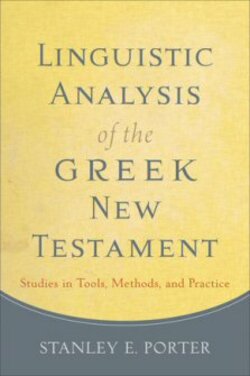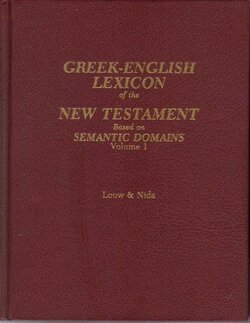
by Donald C. McIntyre
See also Part 1
Verbal Aspect has the Ability to Show Points of Emphasis and De-emphasis
In Porter’s analysis of Philippian 2:5-11 the two verbal forms which are not in the perfective aspect are the imperative φρονεῖτε, “Have this mind,” and ὑπάρχων, a present participle “to be,” in vv. 5 and 6a. In this case, Paul is issuing a command for the Philippians to imitate the mind of Christ, which is described through the hymn in two parallel structures revolving around secondary clauses (vv. 6 and 9a in S-C-P order) which are supplemented by two secondary embedded clauses (vv. 7a and b, and 9b and 10, S-P order), and a final secondary embedded secondary clause (vv. 8 and 11, C-S order).1
Through marking out these functions, Porter notes that:
The choice of lexis within the grammatical configurations recounts a movement from likeness to demotion to exaltation, and this forms the basis for the major theme of the movement of Christ Jesus in this passage. . . Christ Jesus is first stated to be equal with God but not grasping such equality, and instead he, as agent, demoted himself by taking human form and likeness, but God elevated him to a position where others worship him. Thus there are two status levels indicated, that of God and that of humans, with Christ Jesus moving between the two.2
Though the chapter in which this article was presented was more focused on the multi-disciplinary interactions involved in exegesis, one can apply Porter’s views of aorist VA to the discussion and narrow down a few more features.
Because φρονεῖτε, “Have this mind,” and ὑπάρχων, “to be,” are not in the aorist tense, but the structure is coherent with structural parallels, Paul was drawing attention to these two ideas. Christians are commanded to have the same frame of mind which Christ displayed; and that frame of mind which Christ displayed was predicated on his deity. The imperfective aspect of the present tense form of the command φρονεῖτε has the semantic value of added expectation. In this view, the Christian is commanded (expected) to display themselves always as having the same mind frame of Christ.
The punch line of this passage though comes with Christ’s journey from likeness with the deity (a form which lexically denotes “the nature or character of something, with emphasis upon both the internal and external form,”)3 to humility (what Porter references as demotion,) and then receiving the exaltation of God. This process of Christ’s journey is viewed as perfective aspect through the aorist tense. The aorist Aspect described by Porter where “The Aorist as semantically the least heavily marked verb form is aspectually perfective, frequently occurring in past contexts as the background narrative tense,”4 and has described perfective aspect as viewing the event as a whole.
In this case, Christ’s entire existence from eternity to the time of writing is described in broad brush strokes as Christ was equal to God in internal and external features, He willingly demoted himself, to the role of a servant with all that this entails, and then was exalted by God as His reward for God’s own glory.
The emphasis is less about Christ’s example so to speak as it is upon the need for believers to imitate that example, arguing from the greater to the lesser. If Christ who was as great as, and indeed actually God, could humble himself to serve and endure suffering for a great exaltation, so should his followers who are not God.
Though many would focus on the fact that Chris is alluded to through name or pronoun eight times, and the reader is only referred to once in this passage, this theory of verbal aspect, combined through discourse analysis sees Christ as the supporting argument for the Apostle’s key theme (that the Philippians should exhibit Christ-mindedness, which is described as humility).
Paul is more concerned with exhorting the Philippians to act like Christ in this passage than he is with relaying the account of Christ.
So How Might I Preach That?
There are two foregrounded elements, and the rest is backgrounded, so that means that there should probably be two main points to your sermon, with supporting argument in the second point:
- The Christian’s state of Mind should reflect Christ (Imperative)
- Christ is fully God (present participle)
- But he humbled himself through service and Death (aorist argument)
- God rewarded his humility (aorist argument)
Application: If Christ who is God can humble himself to be exalted, we should too.
In tomorrow’s post, I’ll try his method on a passage in Matthew to see if it still applies.
Donald C. McIntyre is a Ph.D. Student in Old Testament at Baptist Bible Seminary, Clarks Summit, PA.
Resources in Logos referenced in or pertaining to this article include the following:
Joseph H. Hellerman, Philippians
Stanley E. Porter, Linguistic Analysis of the Greek New Testament
Johannes P. Louw and Eugene Albert Nida, Greek-English Lexicon of the New Testament: Based on Semantic Domains
Stanley E. Porter Language and Interpretation Collection (24 vols.)
- There is debate about whether or not this is actually considered a hymn, there have been convincing arguments made by Hellerman that this text was actually an example of a cursus honorum, which the student author has addressed in previous work for the current instructor in NGRK 643. See Hellerman, Joseph H., Köstenberger Andreas J., and Robert W. Yarbrough. Philippians: Exegetical Guide to the Greek New Testament. Nashville, TN: B&H Academic, 2015.
- Porter, Stanley E.. Linguistic Analysis of the Greek New Testament, pp. 101-102.
- Johannes P. Louw and Eugene Albert Nida, Greek-English Lexicon of the New Testament: Based on Semantic Domains (New York: United Bible Societies, 1996), 584.
- Porter, Stanley E., Verbal Aspect, 199.








Another great post, Mac.
Thanks brother!
Your article series has been fascinating so far! Keep up the good work.
Thank you so much for the kind encouragement; it means the world to me!
Yes, but how exactly does emphasizing verbal aspect do anything for you that the older, tense-form way cannot? In other words, please explain what practical difference this emphasis in verbal aspect makes for exegesis and homiletics. Why do I need verbal aspect if I can simply see the aorists as perfective aorists?